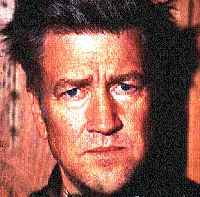
| 
|
| Interviews & Articles |
Is David Lynch Just a Little Weird? He's created Eraserhead, Blue Velvet and Twin Peaks. He's directed sex scenes that give 'twisted' new meaning. Plus, there's a slab of roast beef hanging on his wall. So, go ahead, ask...
Film Threat, April 1997 David Lynch has a painting hanging in his office. It's very lovely, and very David Lynch. For you see, upon closer inspection, it becomes clear that the center of David Lynch's very lovely canvas is dominated by a very old, very large slab of roast beef. Attached to one side of the meat is a mummified squirrel. And to the other side, a dead bird. The squirrel and the bird are covered, like the beef, with a thick, clear, gleaming layer of varnish. They're all dead. Wrapped in plastic. David Lynch talks about the painting with the enthusiasm of a teenager, using words like "neat" and "cool." ("I'm sending it to an art show in France," he declares.) Lynch, awaiting the release of his seventh feature, Lost Highway, starring Bill Pullman and Patricia Arquette, spoke with Film Threat publisher Chris Gore at Asymetrical Productions, the director's home-based office in the Hollywood Hills. (Note: The interview was conducted two weeks prior to the Dec. 30, 1996, death of Jack Nance, the actor who starred in Lynch's 1978 breakthrough, Eraserhead.) Where do you get your ideas? I really believe there's, like, an ocean of ideas. And all of the ideas are sitting there. They bob up from time to time and come into your conscious mind and you know them. When a good idea bobs up, it really smacks you. It's like a piece of electricity and you see the whole thing and you feel it and you know what to do. It all comes with the idea. Since film is basically the art of compromise, how do you get away with what you do on the screen? Well, you don't. You don't compromise. Except that a person has to work with what they have. If you call that a compromise, then you compromise. There are many, many, many things that you're forced to dream up to make do with what you have, but it's not a compromise. It's just different ways to skin this cat. I really believe that even if you just have a little bit of money there are ways to get into that film and make it work without a compromise. It may take a long, long, long time, like in Eraserhead. We didn't have the money but we had the time. Right. I should have rephrased it and said "For many in Hollywood, film is the art of compromise." Well, I don't know, I think that a lot of people are able to get what they want and the one way to get what you want is to have had a hit film. Where there's compromise, to me, is in a studio situation. And I don't really know about it too much. But more and more there's not just one person at the head of the studio that can make the decision. There are, like, committees of people, and if I ever had to go through a committee, I would be in big trouble, because they all want to understand the picture and I don't want to explain in words and not only don't want to, but I can't sometimes, you know what I mean? I love the delicate abstractions that cinema can do and only poets can do with words. Maybe if I could write a poem to them, but it wouldn't work anyway. Do you want to have a hit film? Well, I would like to have a hit film. A hit film means many, many people appreciate this particular film and that would be a unique and pleasurable experience for me. It seems to me that you've had hit films on your terms.
Well, The Elephant Man was a pretty successful picture. But it was, you know, based on a true story. It was further away from what you say, a personal film, although I felt very personal about it and I got into that world, and I feel I didn't compromise. Dune was the only film I've made that was a failure to me. Well, that's nice of you to say. [Laughs.]
|
Lost Highway main page | Lost Highway Interviews | David Lynch main page
© Mike Hartmann
mhartman@iig.uni-freiburg.de